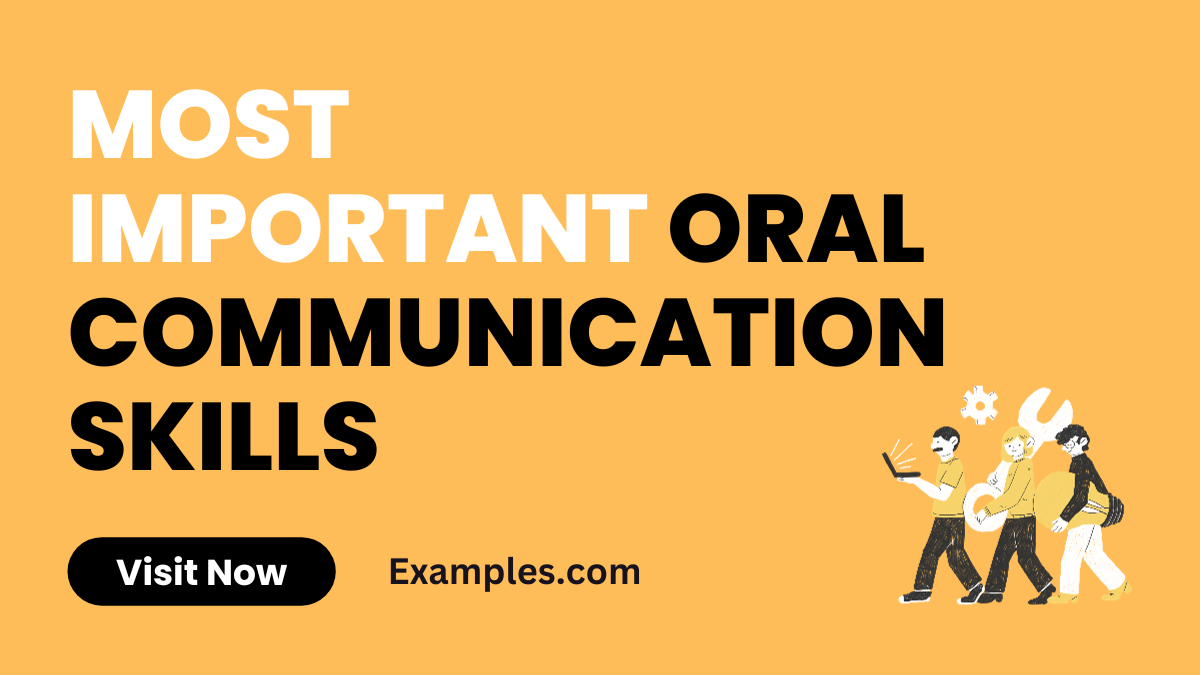Most Important Oral Communication Skills
Oral communication is a vital skill in today’s interconnected world. This comprehensive guide delves into the most important oral communication skills, providing practical, real-world examples to enhance your understanding. From students to professionals, mastering these skills is essential for effective interaction and success. With a focus on techniques and strategies, including various oral communication examples, this guide offers valuable insights for anyone looking to improve their communicative abilities in personal and professional settings.
What are The Most Important Oral Communication Skills?
Oral communication skills are the abilities necessary for effective verbal interaction and information exchange. These include active listening, an essential aspect of oral communication examples, and articulate speaking, vital for conveying messages with clarity and precision. Integral to these skills are understanding and adapting to your audience, utilizing appropriate body language, and being concise in expression. These abilities are central to both the importance of oral communication and its effectiveness in various contexts, from personal dialogues to academic and professional environments. The mastery of these skills ensures that communication is not only heard but also understood, fostering meaningful interactions.
Top 10 Most Important Oral Communication Skills

Effective oral communication is a blend of several key skills. The top 10 most crucial ones include active listening, which emphasizes the importance of fully understanding the speaker’s message, and clear articulation, ensuring your message is understood as intended. Confidence in delivery, empathy towards listeners, and effective non-verbal cues like body language significantly enhance the impact of your communication. Additionally, adapting your message to different audiences and contexts, along with skills in providing and receiving feedback, are indispensable for successful interactions.
Oral communication skills are essential in fostering effective interactions and relationships. Here are the top ten skills vital for successful communication:
- Active Listening: Engage fully in the conversation, showing genuine interest in the speaker’s message.
- Clarity and Conciseness: Deliver your message clearly and succinctly to avoid misunderstandings.
- Confidence: Speak assertively to convey your message with authority and assurance.
- Empathy: Understand and respect others’ viewpoints, creating a more harmonious communication environment.
- Feedback Skills: Give and receive constructive feedback to improve communication dynamics.
- Body Language: Utilize non-verbal cues to complement and reinforce your spoken words.
- Emotional Intelligence: Recognize and manage your emotions and understand those of others.
- Persuasion Skills: Influence others through compelling and reasoned argumentation.
- Public Speaking: Effectively convey your message to larger audiences with confidence.
- Adaptability: Tailor your communication style to different situations and audiences for maximum impact.
Oral Communication Skills Are Important for Students

For students, oral communication skills are fundamental for academic success and personal growth. These skills help in actively participating in classroom discussions, enhancing understanding and retention of information. They also play a crucial role in developing presentation skills, crucial for academic and future professional pursuits. Moreover, effective communication fosters better collaboration with peers and teachers, essential for group projects and team activities. Thus, these skills are not just about academic performance but also about building confidence and essential life skills.
For students, oral communication skills are critical for academic and personal development:
- Enhances Learning: Effective participation in class discussions and presentations aids in the absorption of knowledge.
- Builds Confidence: Regular practice of these skills fosters self-assurance in expressing ideas.
- Improves Collaboration: Team projects and group studies require clear and effective communication.
- Career Preparation: These skills are highly valued in the workplace, preparing students for professional success.
- Develops Critical Thinking: Articulating thoughts and responses hones analytical skills.
Most Important Oral Communication Skills in the Workplace

In the workplace, oral communication skills are indispensable for effective teamwork, leadership, and client relations. These skills include clear and concise communication, which is vital for efficient and error-free exchanges of information. Active listening and empathy help in building strong relationships with colleagues and clients. Additionally, the ability to adapt communication styles to different situations and audiences is crucial in a diverse workplace. These skills contribute to conflict resolution, decision-making, and foster a positive and productive work environment, highlighting their significance in professional settings.
In the workplace, oral communication skills are integral for:
- Team Collaboration: Clear communication fosters teamwork and helps in achieving common goals.
- Leadership: Effective leaders use these skills to motivate, guide, and manage their teams.
- Client Relationships: Building trust and understanding with clients hinges on strong communication skills.
- Conflict Resolution: The ability to communicate effectively is key in resolving misunderstandings and disputes.
- Career Advancement: Proficient communication skills are often linked to professional growth and opportunities.
Additionally, for educators and students seeking to enhance their oral communication skills, academic institutions like Stanford University’s School of Education provide valuable resources and research findings. Their focus on communication within educational settings offers specific strategies and methods to improve both teaching and learning experiences. Leveraging these resources can significantly augment one’s ability to communicate effectively in academic and professional environments, making the journey of mastering oral communication skills a continuous and rewarding one.
In conclusion, mastering most important oral communication skills is crucial in all aspects of life, from personal growth to professional success. This comprehensive guide has equipped you with essential tips and strategies, emphasizing the importance of oral communication. By honing these skills, you can enhance your interactions and relationships, leading to more effective and impactful communication in diverse settings.



